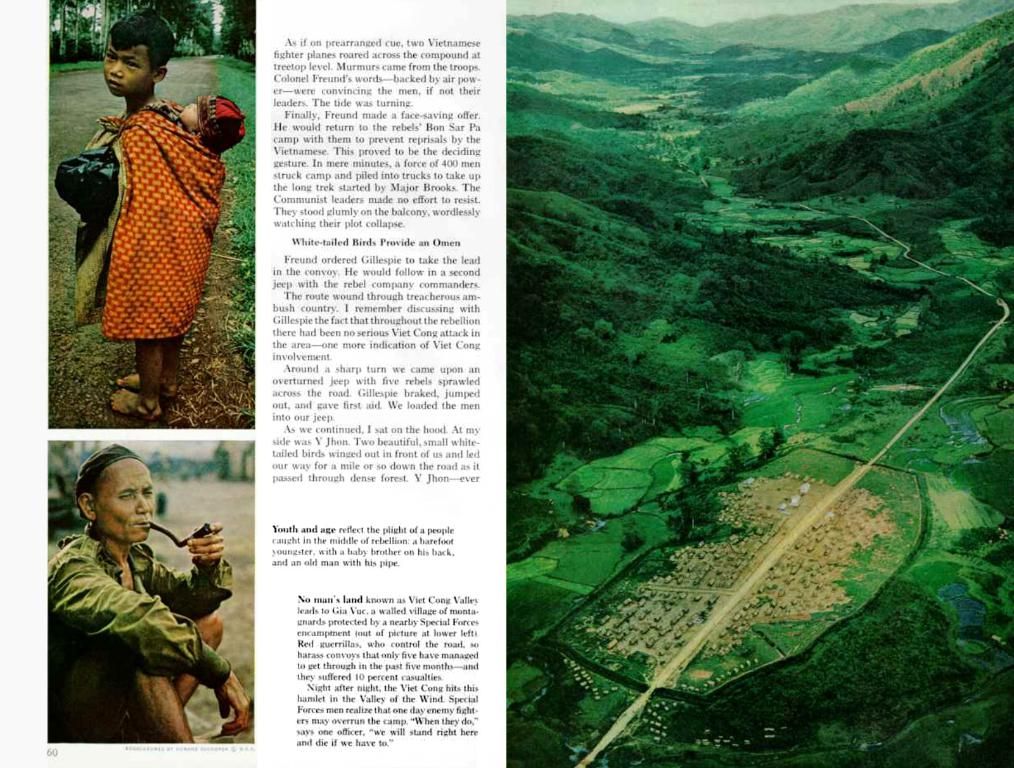Migrant Workers Encounter Escalating Perils in Saudi Arabia
Rebel Yell: A Warning Bell for Migrant Workers in Saudi Arabia's 2034 World Cup Central
Buckle up, folks! Human Rights Watch (HRW) is raising the red flag on a ticking time bomb that's about to detonate in Saudi Arabia – the boom of giant construction sites, and it's not just about bricks and mortar.
This NGO has diligently reviewed nearly 50 cases of migrant worker deaths in Saudi Arabia and has found a pattern of preventable workplace-related accidents, from falls off buildings to decapitation. Unfortunately, Saudi authorities have been awfully lax in protecting these workers, investigating fatalities, and providing proper compensation to families left behind.
HRW's CEO, in a rallying cry, warns us that as King Salman moves forward with the construction of stadiums for the 2034 World Cup, along with other ambitious mega-projects, the risks to migrant workers will skyrocket.
The Gulf kingdom was granted the rights to host the 2034 World Cup in a FIFA Congress last December amidst concerns about its human rights record, risks to migrant labor, and outlawing same-sex relationships.
HRW calls on FIFA to get its act together and properly investigate all work-related deaths and make sure bereaved families receive due compensation.
FIFA has ambitious plans to set up a worker welfare system, promising dedicated standards and enforcement mechanisms suitable for all World Cup-related construction and services in Saudi Arabia. But here's the kicker – FIFA is cagey about the specific methods to prevent, investigate, and compensate migrant worker deaths, such as risk-based heat protection measures or life insurance.
HRW claims that FIFA is needlessly rolling the dice once again with another tournament destined to claim an avoidable human toll. This isn't the first time FIFA has faced criticism over worker welfare issues; similar concerns dogged Qatar ahead of their hosting of the 2022 tournament.
Amnesty International and other human rights groups estimated thousands of migrant workers died in the lead-up to the 2022 tournament. However, Doha insists only 37 workers on World Cup projects perished, with just three attributed to work-related accidents.
Interestingly, HRW reports that the majority of migrant worker deaths in Saudi Arabia are attributed to "natural causes," but these deaths often go uninvestigated and uncompensated. For instance, out of 1,420 Indian migrant worker deaths recorded at the Indian embassy in Riyadh in 2023, 74% were attributed to natural causes.
HRW also mentioned that even work-related death cases categorized as such in a migrant worker's death certificate are often not compensated as required by Saudi law and international labor standards. Let's just say the compensation process, when it does happen, can be agonizingly slow – one case took a full decade to be settled.
A grieving widow voiced: "My sons are 11 and 13 years old. When my husband died, they were 11 months and two years old. If we had received compensation right after his death, it would have provided so much relief."
In response to HRW's report, FIFA shared with us a letter it sent last month to HRW from its secretary general Mattias Grafstrom. The letter highlights Saudi Arabia's efforts to reform labor laws since 2018, including phasing out parts of the kafala system and introducing standardized contracts for workers.
The Saudi government has also committed to working with the United Nations' International Labour Organization (ILO) to expand and effectively implement these reforms.
In conclusion, FIFA faces ongoing criticism for its lack of concrete action to provide worker safety and compensation for potential fatalities. Time to keep an eye on Saudi Arabia and make sure FIFA puts the brakes on another potential human disaster.
- The Human Rights Watch (HRW) urges FIFA to implement specific methods for preventing, investigating, and compensating migrant worker deaths, as concerns about worker welfare continue to surround the 2034 World Cup in Saudi Arabia.
- HRW reports that the majority of migrant worker deaths in Saudi Arabia are often attributed to "natural causes", yet these deaths frequently go uninvestigated and uncompensated, leading to a call for justice and adherence to international labor standards.
- FIFA's plans to set up a worker welfare system for the 2034 World Cup in Saudi Arabia needs to be more transparent and comprehensive, given the league's past criticisms over worker welfare issues, such as those faced in the lead-up to the 2022 tournament in Qatar.
- The ongoing politics of policy-and-legislation, general-news, crime-and-justice, sports, football, and European leagues, are intertwined as debates about migrant worker rights and safety continue to dominate discussions around major international events, such as the 2034 World Cup in Saudi Arabia.








